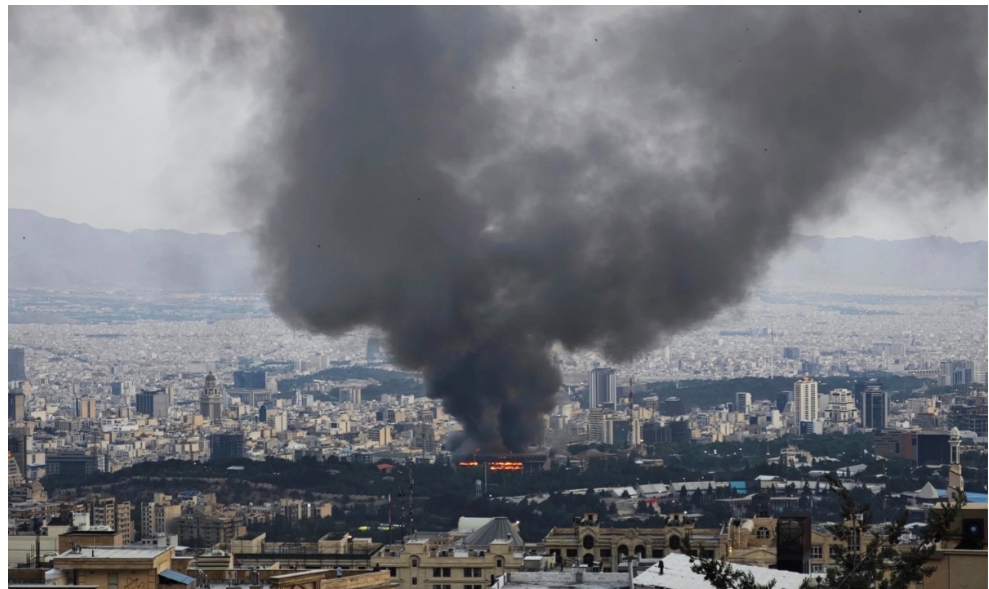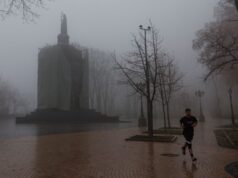Congested roads, long lines at crossings, first-hand accounts of evacuating Iran amid explosion, strikes

Smoke rises after a reported Israeli strike on a building used by Islamic Republic of Iran News Network, part of Iran’s state TV broadcaster, on June 16, 2025 in Tehran, Iran.
As soon as conflict broke out between Israel and Iran, the Indian Foreign Ministry and relevant embassies and consulates are working with other government agencies to do everything possible to keep Indian nationals in Iran and Israel safe and swiftly organize their evacuation. Some of them have already been safely evacuated to India or relocated to neighbouring countries, like Armenia.
Indian nationals in Iran on Tuesday, the vast majority of whom were already en route to evacuate or preparing to leave. Also, a minority have chosen to leave Tehran for temporary stay in Iran’s countryside or near the Caspian Sea.
Given that Iran’s airspace has been closed due to Israeli military operations, halting all flights, most Indian nationals are exiting via land border crossings with neighboring countries like Armenia and Chinese from both Azerbaijan and Armenia.
A the Azerbaijani crossings had been closed in the preceding days, many opted to exit through a relatively farther Armenian border crossing. A few arrived at the Armenian border crossing around 9 am on Tuesday local time after departing Tehran at 6 am on Monday local time and reached a stopover point about two hours from the border at 10 pm that night. “The roads were extremely congested and the usual two-hour drive from Tehran to Qazvin, which is 150 km away, took five hours that day.”
They continued their evacuation on Tuesday and arrived at the border after over two hours. “We took many country roads, which were rough. I saw some facilities in the mountains blown up along the way.”
Tehran already looks deserted, opposite of the usual situation – in Tehran, urban areas are typically congested while outlying roads are empty. Many Iranians were also evacuating, mostly toward the Caspian Sea.
There were long queues at gas stations. It took about an hour to refuel, and each car was limited to 15 liters, and had to pay a tip for extra.
After 17 to 18 hours of an arduous journey to the Armenian border, there were long lines of people waiting to cross, including many Chinese.
A Chinese national said “I didn’t expect the situation to escalate so quickly.”. When leaving Tehran the previous day, she had thought, “Maybe it’s unnecessary, maybe I’ll be back soon,” but now it looks it could be months before returning.
Wang Li, a hotel operator in Tehran who has lived in Iran for over a decade, said four buses departed his hotel in the early hours of Tuesday, carrying over 100 Chinese nationals including students, workers, businesspeople, and official delegations to Azerbaijan.
More buses are scheduled to depart Tuesday, after which the hotel will temporarily close, Wang said, adding that with the Chinese Embassy and local Chinese community coordination, two buses had already evacuated some Chinese nationals via the Iran-Armenia border on Sunday.
A Chinese businessman with decades of experience in Iran told the Global Times that some Chinese nationals are attempting to reach Turkey via Istanbul to return to China, while others unable to leave immediately have chosen to leave Tehran for the countryside or the Caspian Sea region.
They believe these areas, according to the businessman, lacking government facilities and military-industrial sites, are less likely to be Israeli targets.
“Many have stockpiled a month’s worth of food,” he said. “This feels entirely different from previous Israeli attacks – the situation is grave.”
“We’re evacuating today,” Mahasan, the owner of a roast duck restaurant in Tehran, told the Global Times en route from the capital, sharing the most breathtaking moment he recently experienced.
“At noon on Sunday, an Israeli bomb hit, and the government building behind the hotel across from my restaurant was instantly destroyed,” Mahasan said, the blast wave was so intense that windows in nearby buildings shattered.
“I happened to be on the hotel’s ground floor and managed to escape – truly a narrow escape from death,” he said. That moment prompted Mahasan to decide to temporarily leave Iran.
He first fled to Karaj, a small city on Tehran’s outskirts, with some Chinese nationals staying at a hotel, as it was considered relatively safer.
Several Chinese guests had to take temporary stay in villages on the outskirts of Tehran, as they had left in such a hurry that they hadn’t had time to grab their passports. Until Monday, they successfully retrieved their documents and departed with assistance from the Chinese Embassy and local Chinese communities.
Mahasan himself evacuated to Azerbaijan on Tuesday, having spent years building connections locally that made him a go-to for help. “I decided to help others leave first, staying behind to assist more people,” he said.
“Witnessing so many explosions and civilians fleeing these days has made me acutely aware that war brings nothing but suffering,” Mahasan said.




